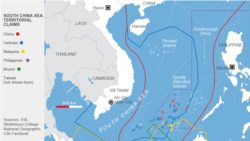Last week, U.S. Secretary of State Mike Pompeo rejected China’s claims to most of the South China Sea as “unlawful.”
In a statement, he said the U.S. “seek to preserve peace and stability, uphold freedom of the seas in a manner consistent with international law.” He added the U.S. would oppose any attempt to use threat or force to settle disputes.
Later in the week, Pompeo added that he would consider protecting other countries against China through legal means. U.S. Assistant Secretary of State David Stilwell also suggested at a conference last week that sanctions could be placed on Chinese officials over the issue.
China has territorial disputes with Brunei, Malaysia, the Philippines, Taiwan and Vietnam over the South China Sea: a part of the Pacific Ocean rich in resources. All of them have weaker militaries than China.
The U.S. has long opposed China’s growing territorial claims. And American warships have regularly sailed in the important waterway to demonstrate freedom of movement there. Yet the comments represent a stronger U.S. position on China’s claims over most of the South China Sea.
However, only Taiwan welcomed the U.S. statement. Other governments avoided making direct comment. And Malaysia’s foreign ministry chose not say anything.
Collin Koh is a maritime security research expert at Nanyang Technological University in Singapore. He said countries in the area will be watching for additional steps. “It will really make Southeast Asia sit up and take notice if there are real concrete actions that follow soon after the recent Pompeo statement,” said Koh.
Nguyen Thanh Trung is director of the Center for International Studies director at University of Social Sciences and Humanities in Ho Chi Minh City, Vietnam. He said Vietnam, which needs China as a trading partner, probably welcomes Pompeo’s plan. But, he said, Vietnam likely hopes not to be singled out as a protected country.
He added, “I think that they hope the U.S. can confront China unilaterally or with some other allies.”
Stephen Nagy is a senior associate professor of politics and international studies at International Christian University in Tokyo. He said U.S. officials will probably only answer to major issues involving China without increasing a conflict.
The U.S. government would ignore local fishing disputes and arguments over placement of oil production structures, he said. American officials might consider answering Chinese ship movements in waters claimed by other countries. This year, Chinese research ships have tested waters claimed by Malaysia and Vietnam.
Nagy said, “It’s a very difficult line to walk between putting significant pressure back on the Chinese without it spiraling into a kinetic conflict."
I’m Jonathan Evans.
Mario Ritter Jr. adapted this story for VOA Learning English with reporting from VOA News, Associated Press and Reuters. Hai Do was the editor.
________________________________________________________________
Words in This Story
maritime –adj. related to sea travel
unilaterally –n. involving only one side
spiraling –adj. moving around in circles, moving further away and with speed
kinetic –adj. involving or producing movement or energy






